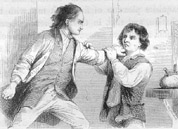
To the co-namesake of my son, Benjamin Thomas….
Dear Tom,
You asked me online quite a while ago about Franklin and slavery. It’s true, he owned slaves for a while, even though later he joined (and was president of) our first society to abolish African slavery in America.
It’s a tough issue for Franklinians, like Jefferson’s owning slaves is a tough issue for people who love the Declaration of Independence (which Franklin helped write). I think the failure of the Constitution to deal with the issue is what Franklin had in mind when he said that while he didn’t like everything in that document, he thought it was the best we were likely to get, and a flawed Constitution would be better than the Articles of Confederation currently in effect.
I think in Franklin’s mind there was a slippery moral slope that started with indentured servitude, multi-year apprenticeships, and other legal means where people would exchange various amounts of their personal freedom for certain benefits. As a very young man, he was bound to (and mistreated by) his brother James, as in the illustration above.
And, of course, slavery was a real part of life then, seen as part of our human race in many times and places. Franklin printed advertisements related to slavery as part of his business. He and Deborah “owned” a few such people, one of which Franklin took to England, where the enslaved person simply walked away into freedom, and Benjamin did not pursue him. Deborah saw to the schooling of at least one of the children. They seemed to have taken all this as part of normal life.
I remember my first visit to the National Museum of African American History and Culture. I realized that its location, which initially annoyed me, was perfect: slavery was right in the middle of everything for a long time, and people came to accept it. It’s appropriate that the museum is smack in the middle of our National Mall.
As a mental exercise to grasp our society’s acceptance of slavery, I think of how people in our own day view animals: are they food? are they owned? For many people, the idea of considering the eating of meat to be some kind of violation of animal rights makes no sense; for others, it is obvious. Reasonable people differ on that topic.
Even with animals we don’t eat, the moral lines can shift. As you know, we’ve always had “a multi-species family” in our home, though I have recently grown uncomfortable considering myself as the “master” or the “owner” of our dogs Peppe, Nuri, Folger or Buddy — are those terms going out of style? In my mind, yes.
As another exercise, I imagine a future in which as a society we consider lumber as an abominable violation of the rights of trees: this now strikes me as idiotic, though I am somewhat squeamish at the cutting down of trees, unless they are cottonwoods. I imagine this is a moral line that could move.
Back to Franklin, and the cultural norm that slavery was during that time, Bill Maher summed it up pretty well recently. He said something like this:
If you were around in the 1780s, and you were rich and white, you likely would’ve had slaves. In 1775, the first abolitionist society was founded, with [only] 24 members.
Stop being surprised — we used to be dumber than we are now.
You are not morally better than your grandparents, you just came later. Things get obsolete because things grow and improve, including us.
Bill Maher, as noted while viewing Real Time, 2019.
Here’s hoping we all grow and improve — Franklin, as in so many things, demonstrated how it can be done.
Yours,
Marty
Concurrence from Mr. Rogers
In the Esquire magazine article behind the recent movie, Fred Rogers is reported to have confronted the changing moral line regarding animals. The script, or the guest, came into this day content with an ownership-related word, and Mr. Rogers moved away from it.
He writes all his own scripts, but on this day, when he receives a visit from Mrs. McFeely and a springer spaniel, she says that she has to bring the dog “back to his owner,” and Mister Rogers makes a face. The cameras stop, and he says, “I don’t like the word owner there. It’s not a good word. Let’s change it to ‘bring the dog home.'”
From the Esquire article.
This seems to me an example of an ethical line moving: slowly, and in a direction that seems obvious in hindsight.
